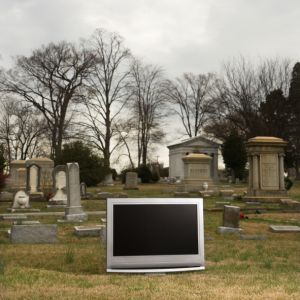
Vampires and zombies have enjoyed the spotlight for several years on the big screen and on bookshelves. While the undead continue to hold viewers' and readers' fascination, the small screen is quietly expanding its treatment of death to include everyday folk and how they deal with the inevitable. Programming is popping up in various forms, including drama, comedy and documentary that explores the end as a natural, if difficult, part of life.
Interest Fueled by Boomers
Gail Rubin believes that programming that concerns itself primarily with death is rare, but it exists. Rubin wrote a book and hosts a podcast that share the name, A Good Goodbye: Funeral Planning for Those Who Don't Plan to Die.
"We don't often see funerals, we don't often see mourning, and we don't often see people just coping with dying or thinking about it the way we do it real life," Rubin said. "But there is a bit more of it happening these days."
A group of people with a growing interest in death are the so-called baby boomers, a demographic loosely defined as Americans born between 1946 and 1964. Just as in the 80s and 90s, when television programming frequently addressed social concerns such as race and sexuality, several shows today reflect an emerging issue for an aging generation over 70 million strong death. Cable's HBO made a statement in the early 2000s with "Six Feet Under," about a family that runs a Los Angeles funeral home. The popular program was a drama infused with dark humor and a good dose of the surreal. Each episode began with a death. Story lines presented end of life in multiple forms, from sudden infant death syndrome to disease to old age. "Six Feet Under" won awards and critical acclaim throughout its five-season run for its complex exploration and contemplation of death. More recently, HBO produced six episodes of "Getting On," a comedy about nursing home life that mines subjects such as dying and dementia for humor.
Real Stories
Fiction is not the only option for the subject on television. Canadian television will soon offer a 24-hour channel devoted to end-of-life issues, called DeathNetworkTV. American cable giant Showtime produced "Time of Death," a documentary series that focuses on the terminally ill. Made by the same people that produce "Top Chef" and "Project Runway," the series follows eight people in the final stages of diseases such as cancer and ALS. The camera reveals not only the concerns of the dying subjects, but those of their families, as well. The program allows room for such complexities as:
- Physical pain
- Medical care
- Financial burden
- Emotional stress
- Family structure, including child custody
"Time of Death" utilizes very little narration, and does not directly address religion or spirituality, per se, although some questions do arise regarding an afterlife.
Appeal of Reality TV
"Best Funeral Ever" is a reality program on TLC that profiles non-traditional funeral and memorial services. One show covered a celebration for a man who loved all things Christmas. Another was dedicated to a state fair-themed memorial. In Texas, friends and family remembered a loved one at a bowling alley. For television producers, shows such as this meet a number of goals. They are entertaining, certainly, but they also echo a trend in how people are thinking about end-of-life subjects. The fact that more people are taking the time to make decisions about what they want their funerals to look like may indicate a more open attitude toward dying in general. Television can both invite viewers into a subject and allow some distance at the same time. Programming that talks about dying through humor, drama or documentary creates a safe space for people to contemplate a difficult but necessary milestone.
Add Your Comment